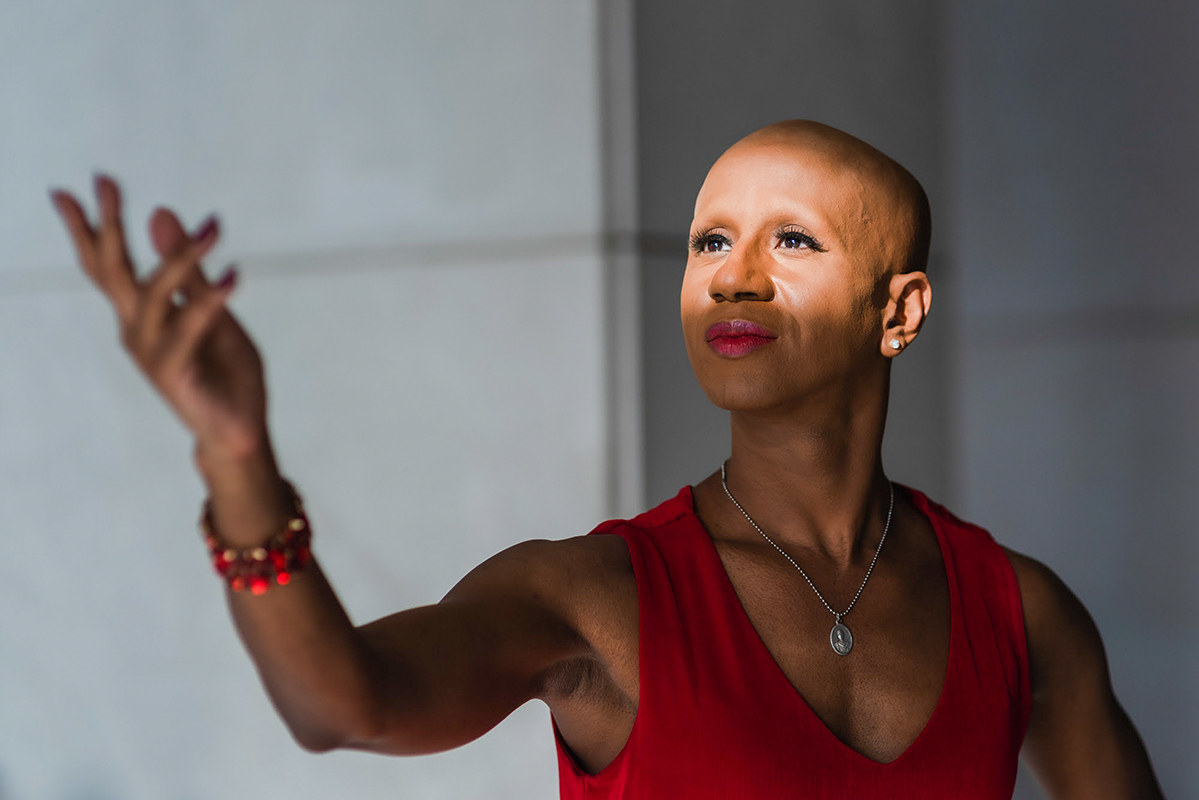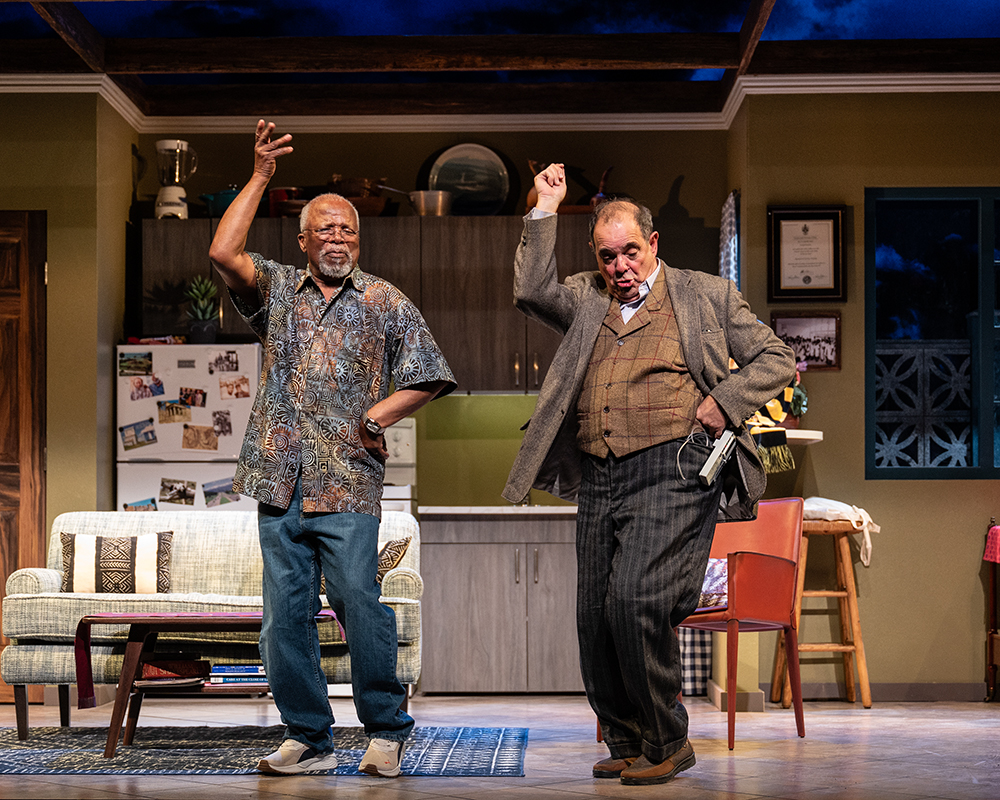DC Theater Review: ‘The Amen Corner’ at Shakespeare Theatre
James Baldwin's "The Amen Corner" feels remarkably fresh, original, and vitally important

In his 1960 essay History is a Weapon, James Baldwin wrote, “It is very nearly impossible…to become an educated person in a country so distrustful of the independent mind.” Sixty years later, and although the “conversations” on racial, sexual, class and political identity are louder and often healthier than ever, they do sometimes come at the expense of a curious mind. Put another way, not everyone finally given voice has enough trust to allow questions, explorations, or challenges to the messaging.
With this in mind, it’s hard not to cheer the Shakespeare Theatre Company for staging James Baldwin’s The Amen Corner (★★★★☆). Although certainly a rich capsule of mid-century African-American urban life, the play is, just as importantly, a fabulous, anarchical refusal to toe anybody’s line.
Baldwin never knew the Alpha choruses of the internet, never knew what it’s like to be caught in the maelstrom of voices providing a language, but also the existence and four corners, of an “identity” — be it one of race, gender, or political party. He embraced and struggled with his experience, but, as is so evident in Amen, he didn’t need to conform to a narrative or require that it confer certainties or sainthood. Instead, it was a life’s contemplation through which he asked the kind of bold and unfettered questions about religion, love, and human frailty that transcend race or ethnicity. Seen amid today’s culture of “core messaging,” it feels remarkably fresh and original.
Set in a church that is at once inside and outside, Baldwin’s space is created by the city in every sense. The world is not just on the doorstep, it has come inside. For this community, it is apt: there is no escaping the poverty and strife born of racism, there are only fleeting moments in which to shelter, be they through love, enterprise, or faith.
Capturing this mood, scenic designer Daniel Soule’s impenetrable walled yard has a certain grim, urban grandeur, the windows either open like portals into a black abyss or covered with lamp-lit curtains, as if to keep out the night. They speak of inner lives filled with small joys and larger despairs, but they also sit in observation of the congregation below. This is a place where community is so strong, so desperate, it might even turn on itself.
Baldwin set the stage for his drama with the community congregation gathering for the sermon of their Pentecostal pastor, Margaret Alexander, and a rousing hymn. The choice to raise the house lights, apparently to draw in the audience, doesn’t quite work and is thankfully short-lived. After this slight misstep, the musical interludes become increasingly exciting signifiers of emotional portent and power. The performances are singular with the chorus-congregants wholly invested. In particular, Nova Y. Payton (Sister Douglass) sings with other-worldly magic and skill, Jade Jones (Sister Rice) brings the house down with her impressive Gospel range, and the searing gaze and velvet voice of Lauryn Simone (Sister Sally) remains immensely memorable.

As the first prayer meeting winds down, it becomes clear that single-minded and commanding Pastor Margaret has been leading the church for some years. When she counsels the terrified new mother Ida Jackson, who arrives with her ailing baby, she shocks her by insisting she leave her non-observant husband and then reassures her that God will protect her child. In this short glimpse of Margaret’s adamance, Baldwin subtly announces his themes: that to love is to be humbled and that one must ask whether God is ever anybody’s answer. Carefully orchestrated, director Whitney White sets a simple, almost stark vision — one that keeps the mood urgent and relevant, despite the play’s era.
Almost as soon as Margaret speaks with such certainty, her world is rocked by the arrival of her mysterious, jazz musician husband Luke. Deathly ill, he is seeking reconciliation, but also truth. When the congregant elders discover another side to Margaret, simmering resentments surface and Margaret loses hold of her uncompromising façade.
But where another playwright might have explored redemption, Baldwin had bigger, better, near-subversive, fish to fry. Not only is forgiveness thin on the ground, Margaret never answers Ida Jackson’s most primal questions: what kind of God allows children to suffer? Is this a God anyone can or should “obey”? These are explorations so confident and independent that characters can fail, identities can falter, and challenges can even be made to the value of religion. For this alone, the play is a treasure.
Still, this is an early work, and Baldwin never quite develops Margaret’s complex relationship with Luke or her son, David. Matters aren’t helped by Mia Ellis’ Margaret, who never quite rings true. Though she cuts a charismatic figure and is fluent with Baldwin’s language, there is too little nuance in Ellis’ delivery and expression and it feels self-conscious. As Luke, Chike Johnson is convincingly grim, hopeful and painfully intimate, but he has too little to play against with this short-range Margaret. The chemistry with son David, played with earnest energy, if a bit too young, by Antonio Michael Woodard, is more fraught than genuine.
That said, much is carried by other key characters. E. Faye Butler captures her Sister Moore with hilarious sensibility but also reveals, with great skill, a fearsome inner life (as well as a fabulously expressive singing voice). As Margaret’s sister Odessa, Harriett D. Foy brings the angst and nuance that Ellis needed, while Deidra Lawan Starnes captures Sister Boxer’s resentment with credible personality and edge.
Baldwin may be a voice from the past, but his example and belief in an independent mind has never been more important.
The Amen Corner runs through March 15 at Sidney Harman Hall, 610 F St. NW. Tickets are $35 to $120. Call 202-547-1122 or visit www.shakespearetheatre.org.
Support Metro Weekly’s Journalism
These are challenging times for news organizations. And yet it’s crucial we stay active and provide vital resources and information to both our local readers and the world. So won’t you please take a moment and consider supporting Metro Weekly with a membership? For as little as $5 a month, you can help ensure Metro Weekly magazine and MetroWeekly.com remain free, viable resources as we provide the best, most diverse, culturally-resonant LGBTQ coverage in both the D.C. region and around the world. Memberships come with exclusive perks and discounts, your own personal digital delivery of each week’s magazine (and an archive), access to our Member's Lounge when it launches this fall, and exclusive members-only items like Metro Weekly Membership Mugs and Tote Bags! Check out all our membership levels here and please join us today!


























You must be logged in to post a comment.